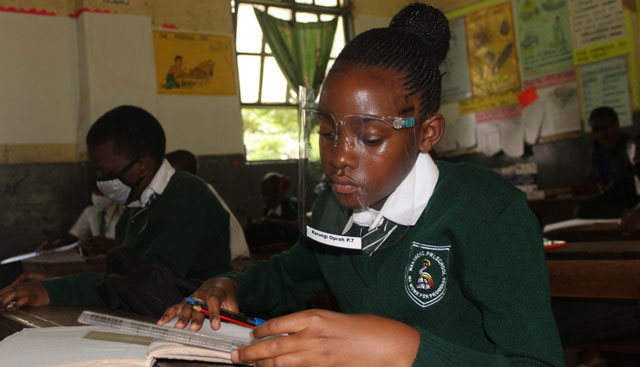
Kampala, Uganda | THE INDEPENDENT | Educationists, teachers and parents have welcomed a move by the government to end the closure of schools after almost a year of limited activity. The schools were closed in March 2020, following the outbreak of coronavirus disease, an ailment which, according to experts, spreads faster through person to person contact.
Last evening, the cabinet approved a recommendation to reopen education institutions for non-candidate classes. Although no dates have been announced for the official reopening, the cabinet said in a statement this morning that schools will now be allowed to reopen in a staggered manner that will ensure compliance with COVID-19 standard Operating Procedures. This will be the second phase of the reopening after candidate classes.
The Ministers resolved that in order to complete the academic year and ensure progression, all semi candidate classes, which include Primary six, senior three and senior five should report back to school in the short term and study with the candidate classes.
Patrick Kaboyo, an educationist says the decision is exciting because it will enable children to return to safe learning environments as opposed to communities and the home set up which was exposing many of them to abuses and violations.
Filbert Baguma, the Secretary-General of the Uganda National Teachers Union-UNATU says the decision to re-open schools is timely and welcome. He says following the re-opening of markets, arcades, public transport and places of worship, it was high time that schools were re-opened.
However, Baguma cautions that the government should be willing to properly fund the re-opening of schools as a top priority.
For Rhitah Namukasa, a private school teacher from Masaka, the reopening means that they are going to regain their sources of livelihood after over a year of suffering. “When they reopened for candidates, the headteachers recalled a few teachers whom they could afford to pay. Some of us remained idle struggling to make ends meet. We hope that the reopening will give us a chance to get back to our jobs,” said Namukasa.
Similarly, Godfrey Birungi, the head teacher of Mbarara Secondary School welcomes the decision to have a staggered or shift system of learning which according to him is long overdue. However he stresses that there is a need for clarification on several standards operating procedures like the two-meter distance rule and a requirement for schools to operate as day or boarding schools, and not both.
Janet Asiimwe, a vendor in Kamwokya market and a parent of two semi-candidates says that she can ‘breathe a little’ following the government’s decision.
“I have a daughter and a son in Primary six and se.3. It has been hard leaving these children home. I have been worried that they might get bad friends after being home for all this time. I do not have money on me right now, but I would rather look for the money and have peace of mind that they will be safe at school, ”she said.
Grace Kyobutungi, a resident of Kamwokya and a parent of two semi candidates in senior three and primary six says that the reopening for the non-candidates is a good step, however, for many parents, a challenge to raise school fees after the COVID-19 experience. Kyobutungi is now calling for the suspension of night-time curfew.
“Let the government remove curfew and enable the parents look for school fees without excuses, but with a curfew in place especially for people like me who work at night it becomes hard” Kyobutungi adds. She also says that the government need to consider giving at least a grace period of two years without paying school fees as they recover from the COVID-19 challenges.
Ibrahim Ssuna, a parent in Kyebando says that the government should concentrate on creating a good working environment for the parents to look for money. “We want our children to go back to school but the money now is a problem and we know that even the schools are going to hike the school fees so all this comes back to the parent,’ Ssuna says.
However, Bernard Twesigye, a businessman in Mulago says the idea of leaving out the pre-primary learners is not good. “A child of six years can be in a position to speak and also understand what they require her or him to do. The government should look into this and allow them to get back to school.” He says that the government should have fully reopened the learning institutions without discrimination because of the impact of the long stay is unmeasurable.
Edward Kanoonya, the headteacher of Kololo Secondary School says that while the government’s decision to re-open schools is welcome, the re-opening only benefits a few students. He says the phased re-opening of schools leaves both teachers and learners in suspense.
With over 1,000 finalists and another 1,000 plus students expected to return to school in the near future, Kanoonya adds that school like his, with big student populations will have to devise new means to ensure that learning takes place as they adhere to the set SOPs.
To cater for big numbers, the cabinet has also guided that for the classes studying in shifts; the teacher will be guided to work through the homeschooling materials with the view of explaining and clarifying concepts. They also collect self-study work done by learners at home.
Last year, over 200 infections of COVID-19 were reported among finalists who have resumed learning. With more learners expected to join the 1.2 that are already in school, health ministry officials say that schools need to heighten their level of surveillance in schools.
********
URN
 The Independent Uganda: You get the Truth we Pay the Price
The Independent Uganda: You get the Truth we Pay the Price





